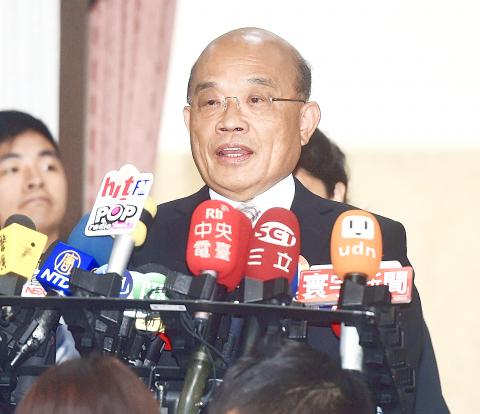Noting that a peace treaty between the UK and Germany in 1938 did not prevent the two from going to war, Premier Su Tseng-chang (蘇貞昌) yesterday said that people should “heed history’s lessons and not repeat its mistakes.”
Su made the remark at the Legislative Yuan when asked for comment on the Chinese Nationalist Party’s (KMT) accusation on Thursday that by refusing to sign a cross-strait peace agreement, the Democratic Progressive Party (DPP) is “courting war and rejecting peace.”
“The KMT’s tone resembled that of [former British prime minister Neville] Chamberlain before he flew to Berlin and signed the agreement with Adolf Hitler,” Su said. “[Chamberlain] proudly brandished the agreement as he disembarked his airplane, only to see Hitler wage a war later.”

Photo: Chien Jung-fong, Taipei Times
Su was referring to the Munich Agreement spearheaded by Chamberlain in 1938 and signed by the UK, France, Italy and Nazi Germany, which pressed then-Czechoslovakia into ceding the Sudetenland.
Hitler at the time said that the Sudetenland was the last territorial claim he was to make in Europe, only to renege on the agreement and invade the rest of Czechoslovakia in 1939.
Within a year, Britain and France were at war with Germany.
Under the leadership of former British prime minister Winston Churchill, the UK fought long and hard before winning World War II, Su said, urging people to learn from history and not repeat its mistakes.
The KMT on Thursday posted on Facebook five questions it deemed most frequently asked about a possible cross-strait peace treaty and their answers.
One asked why the DPP is afraid of signing a peace treaty with Beijing.
“The DPP has to cover up for its incompetence and helplessness in maintaining cross-strait peace,” it said. “Does the DPP not want peace and only want war?”
Another asked what would be the guiding principles for inking such an agreement, which the KMT said would be signed under the precondition that the “sovereignty and dignity of the Republic of China are protected” and would conform with the Act Governing Relations Between the People of the Taiwan Area and the Mainland Area (臺灣地區與大陸地區人民關係條例).
Another asked whether the KMT, in its capacity as a political party, would sign a peace agreement with the Chinese Communist Party, to which the KMT said that only groups authorized by the government would be allowed to negotiate and sign such an agreement.
Regarding the need for referendums before negotiations and after the conclusion of talks, the KMT said that it did not rule out such a possibility.
“However, proposed amendments requiring a cross-strait peace treaty to be put to a referendum must be feasible and receive widespread public support,” it said.
The Executive Yuan earlier this week proposed amendments to the act, which would require a negotiation proposal to be approved by two-thirds of lawmakers, as well as a consultative referendum.
The draft amendments say that after the completion of negotiations, the draft agreement would require a vote by a quorum of at least three-quarters of the legislature and approval by three-quarters of legislators in attendance, before being put to a national referendum.
Regarding the question of whether a cross-strait peace treaty would be an agreement for “surrender or unification,” as some have claimed, the KMT said that such an association was the result of an attempt by the DPP and administration officials to stigmatize any deal.
While the post was likely meant to assuage public concern after criticism grew after KMT Chairman Wu Den-yih (吳敦義) signaled that the KMT could sign a peace agreement with Beijing if the party returns to power next year, it has seemingly backfired online.
As of press time last night, about 7,700 of 9,500 reactions to the post were “angry faces,” with many netizens saying that the KMT was treating people as if they are gullible.

DEFENDING DEMOCRACY: Taiwan shares the same values as those that fought in WWII, and nations must unite to halt the expansion of a new authoritarian bloc, Lai said The government yesterday held a commemoration ceremony for Victory in Europe (V-E) Day, joining the rest of the world for the first time to mark the anniversary of the end of World War II in Europe. Taiwan honoring V-E Day signifies “our growing connections with the international community,” President William Lai (賴清德) said at a reception in Taipei on the 80th anniversary of V-E Day. One of the major lessons of World War II is that “authoritarianism and aggression lead only to slaughter, tragedy and greater inequality,” Lai said. Even more importantly, the war also taught people that “those who cherish peace cannot

Taiwanese Olympic badminton men’s doubles gold medalist Wang Chi-lin (王齊麟) and his new partner, Chiu Hsiang-chieh (邱相榤), clinched the men’s doubles title at the Yonex Taipei Open yesterday, becoming the second Taiwanese team to win a title in the tournament. Ranked 19th in the world, the Taiwanese duo defeated Kang Min-hyuk and Ki Dong-ju of South Korea 21-18, 21-15 in a pulsating 43-minute final to clinch their first doubles title after teaming up last year. Wang, the men’s doubles gold medalist at the 2020 and 2024 Olympics, partnered with Chiu in August last year after the retirement of his teammate Lee Yang

The Philippines yesterday criticized a “high-risk” maneuver by a Chinese vessel near the disputed Scarborough Shoal (Huangyan Island, 黃岩島) in a rare incident involving warships from the two navies. The Scarborough Shoal — a triangular chain of reefs and rocks in the contested South China Sea — has been a flash point between the countries since China seized it from the Philippines in 2012. Taiwan also claims the shoal. Monday’s encounter took place approximately 11.8 nautical miles (22km) southeast” of the Scarborough Shoal, the Philippine military said, during ongoing US-Philippine military exercises that Beijing has criticized as destabilizing. “The Chinese frigate BN 554 was

The number of births in Taiwan fell to an all-time monthly low last month, while the population declined for the 16th consecutive month, Ministry of the Interior data released on Friday showed. The number of newborns totaled 8,684, which is 704 births fewer than in March and the lowest monthly figure on record, the ministry said. That is equivalent to roughly one baby born every five minutes and an annual crude birthrate of 4.52 per 1,000 people, the ministry added. Meanwhile, 17,205 deaths were recorded, resulting in a natural population decrease of 8,521, the data showed. More people are also leaving Taiwan, with net